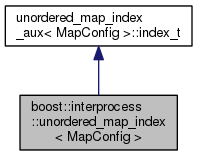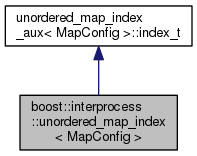|
| | unordered_map_index (segment_manager_base *segment_mngr) |
| | Constructor. More...
|
| |
| void | reserve (typename segment_manager_base::size_type n) |
| | This reserves memory to optimize the insertion of n elements in the index. More...
|
| |
| void | shrink_to_fit () |
| | This tries to free previously allocate unused memory. More...
|
| |
| allocator_type | get_allocator () const BOOST_NOEXCEPT |
| |
| bool | empty () const BOOST_NOEXCEPT |
| |
| size_type | size () const BOOST_NOEXCEPT |
| |
| size_type | max_size () const BOOST_NOEXCEPT |
| |
| iterator | begin () BOOST_NOEXCEPT |
| |
| const_iterator | begin () const BOOST_NOEXCEPT |
| |
| local_iterator | begin (size_type n) |
| |
| const_local_iterator | begin (size_type n) const |
| |
| iterator | end () BOOST_NOEXCEPT |
| |
| const_iterator | end () const BOOST_NOEXCEPT |
| |
| local_iterator | end (size_type) |
| |
| const_local_iterator | end (size_type) const |
| |
| const_iterator | cbegin () const BOOST_NOEXCEPT |
| |
| const_local_iterator | cbegin (size_type n) const |
| |
| const_iterator | cend () const BOOST_NOEXCEPT |
| |
| const_local_iterator | cend (size_type) const |
| |
| template<class... Args> |
| std::pair< iterator, bool > | emplace (BOOST_FWD_REF(Args)...args) |
| |
| template<class... Args> |
| iterator | emplace_hint (const_iterator, BOOST_FWD_REF(Args)...args) |
| |
| std::pair< iterator, bool > | insert (value_type const &x) |
| |
| std::pair< iterator, bool > | insert (BOOST_RV_REF(value_type) x) |
| |
| iterator | insert (const_iterator hint, value_type const &x) |
| |
| iterator | insert (const_iterator hint, BOOST_RV_REF(value_type) x) |
| |
| template<class InputIt > |
| void | insert (InputIt, InputIt) |
| |
| void | insert (std::initializer_list< value_type >) |
| |
| iterator | erase (const_iterator) |
| |
| size_type | erase (const key_type &) |
| |
| iterator | erase (const_iterator, const_iterator) |
| |
| void | quick_erase (const_iterator it) |
| |
| void | erase_return_void (const_iterator it) |
| |
| void | clear () |
| |
| void | swap (unordered_map &) |
| |
| hasher | hash_function () const |
| |
| key_equal | key_eq () const |
| |
| mapped_type & | operator[] (const key_type &) |
| |
| mapped_type & | at (const key_type &) |
| |
| mapped_type const & | at (const key_type &) const |
| |
| iterator | find (const key_type &) |
| |
| const_iterator | find (const key_type &) const |
| |
| template<class CompatibleKey , class CompatibleHash , class CompatiblePredicate > |
| iterator | find (CompatibleKey const &, CompatibleHash const &, CompatiblePredicate const &) |
| |
| template<class CompatibleKey , class CompatibleHash , class CompatiblePredicate > |
| const_iterator | find (CompatibleKey const &, CompatibleHash const &, CompatiblePredicate const &) const |
| |
| size_type | count (const key_type &) const |
| |
| std::pair< iterator, iterator > | equal_range (const key_type &) |
| |
std::pair< const_iterator,
const_iterator > | equal_range (const key_type &) const |
| |
| size_type | bucket_count () const BOOST_NOEXCEPT |
| |
| size_type | max_bucket_count () const BOOST_NOEXCEPT |
| |
| size_type | bucket_size (size_type) const |
| |
| size_type | bucket (const key_type &k) const |
| |
| float | max_load_factor () const BOOST_NOEXCEPT |
| |
| void | max_load_factor (float) BOOST_NOEXCEPT |
| |
| float | load_factor () const BOOST_NOEXCEPT |
| |
| void | rehash (size_type) |
| |
| void | reserve (size_type) |
| |
template<class MapConfig>
singleton boost::interprocess::unordered_map_index< MapConfig >
Index type based in unordered_map.
Just derives from unordered_map and defines the interface needed by managed memory segments

